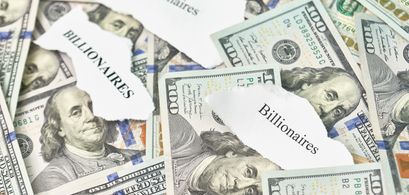According to a recent 2023 poll by the Wall Street Journal, over half (56%) of Americans now believe a degree is no longer worth the time and money spent. There's no doubt that getting a college degree is a long and tough feat - financially, mentally and physically. But is getting into extortionate tuition debt of up to $200,000 even worth it anymore?
A new study by Moneyzine.com analysed the 50 richest billionaires according to Forbes to reveal whether the wealthiest people in the world have degrees. The study also reveals what degrees these billionaires studied, how gender and nationality play into the mix, and how many were self-made or born into wealth.
76% of the Forbes Top 50 Billionaires have a university degree
According to the study, over three-quarters (76%) of Forbes' top 50 Billionaires have a degree, while 24% didn't pursue a college education or dropped out during the process.
Billionaires including Larry Ellison (Chief Technology Officer of Oracle, $107bn net worth), Bill Gates (American business magnate, $104bn net worth), and Amancio Ortega (founder and former chairman of Inditex fashion group ie Zara, $77.3bn net worth), all either dropped out of college or never even pursued higher education.
Other billionaires that don’t have a degree include Mark Zuckerberg (Managing Director of Meta, $64.4bn net worth), Michael Dell (Managing Director of Dell, $50.1bn net worth), Gautam Adani (Chairperson of Adani Group, $47.2bn net worth) and François Pinault (founder of the luxury group Kering ie. Gucci, $40.1bn net worth).
The only Forbes 50 female billionaire who doesn’t have a degree is Rafaela Aponte-Diamant, (who owns a 50% stake in MSC, the world's largest shipping line, $31.2bn net worth).
88% of the Forbes Top 50 Billionaires are men, while only 12% are women
Unfortunately, just one in eight of the Forbes top 50 billionaires are female, while a whopping 88% are men.
Interestingly, the top 5 female billionaires all were either born into or inherited their wealth - including Françoise Bettencourt Meyers (granddaughter of the founder of L'Oreal, $80.5bn net worth), Julia Koch (inherited a 42% stake in Koch Industries, $59bn net worth), Alice Walton (daughter of Walmart founder Sam Walton, $56.7bn net worth), Jacqueline Mars (the granddaughter of Frank C. Mars, founders of the American candy company Mars, Incorporated, $38.3bn net worth) and Miriam Adelson (widow of Sheldon Adelson, the former CEO of casino company Las Vegas Sands, $35bn net worth).
The degrees these women studied include International Jewish-Christian relations, Education, Economics, Anthropology and Microbiology and Genetics.
32% of the Forbes Top 50 Billionaires come from wealthy families
When analysing the percentage of billionaires that have come from wealthy families, almost one-third (32%) of the Forbes top 50 billionaires inherited their wealth or were really well off to begin with. The other two-thirds (68%) were not born into wealth and could be considered self-made billionaires.
These 34 self-made entrepreneurs include Jeff Bezos (Executive Chairman of Amazon, $114bn net worth), Larry Ellison, Warren Buffet (CEO of Berkshire Hathaway, $106bn net worth), and Bill Gates. Julia Koch, Miriam Adelson and Rafaela Aponte also didn't come from wealthy families yet still inherited their wealth.
The US, France and China have the most billionaires in the Forbes ranking
According to the findings, the US has the most billionaires that feature in Forbes’ top 50 with almost half (48%) of the world’s wealthiest featuring here. France and China are second with 5 billionaires (10%) each including Zhong Shanshan from China (founder of the Nongfu Spring beverage company, $68bn net worth).
Germany is third with 3 (6%) of billionaires including Dieter Schwarz (owner of the Schwarz-Gruppe, $42.9bn net worth). India, Italy and Hong Kong have 2 (4%) each in the top 40. The rest of the countries have 1 (2%) represented in the list.
Engineering, Economics and Business Administration are the most common Forbes Top 50 Billionaire degrees
According to the findings, the most common degree among the Forbes top 50 Billionaires is Engineering with 11 (22%) billionaires studying this at universities including École Polytechnique, University of Pennsylvania, Mumbai University and Massachusetts Institute of Technology.
Economics is second with 7 (14%) billionaires, studying this at universities including the University of Pennsylvania, Harvard University, and Trinity University. Business Administration comes third with 6 (12%) billionaires studying this at universities including the University of Nebraska, the University of Arkansas, the University of Arkansas and the University of Mannheim.
Interestingly, 9 (18%) of the top 50 billionaires graduated with two degrees, and 13 (26%) pursued studies beyond undergrad (Masters, PhD, Law School, etc).
So do you need a degree to ‘make it’?
It’s clear that based on the findings of our study, having a degree can absolutely help aspiring billionaire entrepreneurs reach their full potential - but it never was and never will be absolutely essential. In fact, just looking at stats for the average college-goer, ‘graduates with a bachelor’s degree earn $2.8 million over the course of their careers, compared to $1.6 million for high school graduates’. So it’s no secret that getting a degree can help in building financial wealth. For those wanting to ‘replicate’ the successes of the billionaires that feature in Forbes top 50, ultimately that starts with understanding what you’re truly passionate about, taking calculated risks, and using what wealth you have advantageously.Jonathan Merry, career expert at Moneyzine.comJonathan Merry
Methodology:
Moneyzine analysed the top 50 richest on the Forbes billionaire list and manually researched how many have degrees, which demographics hold the most degrees, what degrees they studied and whether they came from rich families.
Contributors





